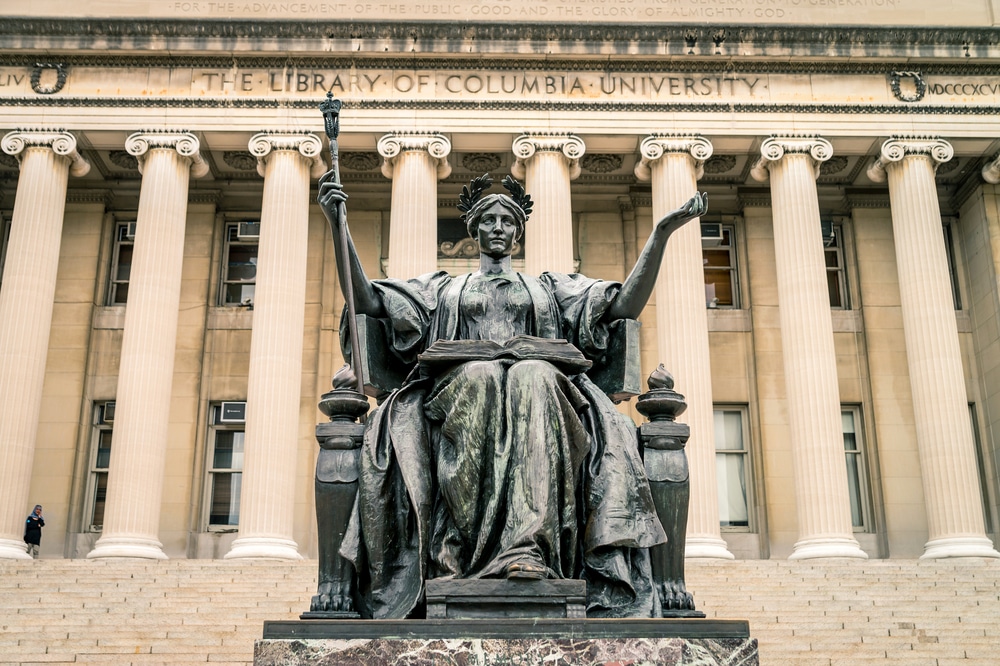What Major is Columbia Known For?
What is Columbia University?
Columbia University was founded in 1754 as King’s College. This is done through a royal charter issued by King George II of England. This university holds a distinguished place in the history of American higher education. With its original location in Lower Manhattan, it has since moved to its current Morningside Heights campus in New York City, designed by the renowned architect Charles Follen McKim. With its rich history, more students are trying to learn what major is Columbia known for.
Throughout its more than two-and-a-half-century history, Columbia has consistently been at the forefront of academic innovation and discovery, earning a reputation for excellence in various disciplines. The university’s dedication to intellectual inquiry and rigorous academic standards has attracted a diverse and talented student body and a distinguished faculty that includes numerous Nobel laureates, Pulitzer Prize winners, and other esteemed scholars.
With a strong emphasis on interdisciplinary learning and cutting-edge research, Columbia has solidified its standing as a global leader in higher education, producing generations of influential leaders, thinkers, and innovators across various fields.
Columbia University core curriculum
Columbia University’s Core Curriculum, a distinctive feature of its undergraduate education, was established in 1919 as a response to the need for a comprehensive, well-rounded education that would prepare students for the challenges of the modern world.
The Core Curriculum of Columbia University aims to provide students with a solid foundation in the humanities, social sciences, and natural sciences, regardless of their chosen major, while fostering critical thinking, cultural literacy, and intellectual curiosity. This unique approach to undergraduate education emphasizes key courses such as Literature Humanities, Contemporary Civilization, Art Humanities, Music Humanities, and Frontiers of Science, among others.
These courses delve into influential texts, ideas, and artistic works from various historical periods and cultural contexts. They encourage students to engage in thoughtful discussions, analyze complex arguments, and develop their perspectives on significant issues.
By instilling a deep appreciation for the liberal arts tradition and cultivating essential skills such as communication, problem-solving, and ethical reasoning, the Core Curriculum prepares Columbia graduates to thrive in an increasingly interconnected and rapidly changing world.
Notable majors at Columbia
Journalism
The Columbia School of Journalism, founded in 1912 by the legendary publisher Joseph Pulitzer, has a history of producing some of the world’s most accomplished and influential journalists. As one of the oldest and most prestigious journalism schools in the United States, the institution has consistently set the standard for journalistic excellence, fostering a commitment to accuracy, integrity, and public service.
The school is intrinsically linked to the prestigious Pulitzer Prize, established by Pulitzer’s bequest in his 1904 will and awarded annually by Columbia University to recognize outstanding achievements in journalism, literature, and musical composition.
With its rigorous curriculum, cutting-edge facilities, and distinguished faculty, the Columbia School of Journalism has nurtured generations of journalists who have won numerous Pulitzer Prizes and other prestigious awards, such as the Peabody Awards, the Polk Awards, and the National Magazine Awards. No wonder this is considered one of the most notable majors at Columbia.
Through its graduates’ accomplishments and dedication to upholding the profession’s highest standards, the Columbia School of Journalism has made an indelible impact on the field, shaping how news is reported, analyzed, and consumed worldwide.
Engineering
The Fu Foundation School of Engineering and Applied Science, established in 1864 as the School of Mines and renamed in 1997 in honor of Chinese businessman and philanthropist Z. Y. Fu, is Columbia University’s renowned hub for engineering and applied science education and research.
The reason why this is a frequent result in the discussion of what major is Columbia known for is that this program has a focus on interdisciplinary collaboration and innovative problem-solving. Because of this, the school has made significant contributions to advancing technology, science, and engineering in various domains.
Notable research areas at the Fu Foundation School include nanotechnology, biomedical engineering, computer science, and sustainable energy. Over the years, the school’s faculty and alumni have been responsible for groundbreaking innovations and discoveries, such as the development of the first nuclear reactor, the creation of the laser, and the invention of the FM radio.
By fostering an environment that encourages intellectual curiosity, creativity, and collaboration, the Fu Foundation School of Engineering and Applied Science has played a pivotal role in shaping the future of technology and engineering, with its graduates impacting industry and academia.
Political Science
Columbia University’s esteemed School of International and Public Affairs (SIPA), founded in 1946, has earned a reputation for excellence in political science, particularly in international relations and public policy. Those who are trying to learn what major is Columbia known for will learn that the school’s mission is to equip students with the knowledge, skills, and networks necessary to address complex global challenges and make a meaningful impact in the world.
With a diverse and accomplished faculty that includes renowned scholars, policymakers, and practitioners, SIPA provides students with unique opportunities to engage in rigorous academic inquiry and gain real-world insights into the workings of the global political landscape.
The school has produced numerous prominent alumni who have gone on to hold influential positions in government, international organizations, and non-profit institutions, as well as distinguished professors who have made significant contributions to the study and practice of political science.
Among the notable figures associated with SIPA is former U.S. Secretary of State Madeleine Albright, Nobel Peace Prize laureate and former president of Timor-Leste José Ramos-Horta, and leading political scientist and international relations expert Robert Jervis. Through its commitment to academic excellence, an interdisciplinary approach, and a global focus, SIPA has cemented its status as a premier institution for political science education and research, shaping generations of leaders and thinkers in the field.
Economics
The Department of Economics at Columbia University is renowned for its distinguished faculty, groundbreaking research, and the significant contributions it has made to economics. The department has been home to some of the most influential economists of the 20th and 21st centuries, who have made substantial advancements in areas such as economic theory, econometrics, international economics, and public policy.
Among its notable faculty members are Gary S. Becker, who pioneered the application of economic principles to social phenomena, and Edmund Phelps, who made seminal contributions to understanding inflation and unemployment.
Columbia’s Department of Economics has also been associated with several Nobel Prize winners, including Joseph Stiglitz, who was awarded the prize in 2001 for his analysis of markets with asymmetric information, and Paul Krugman, who received the award in 2008 for his work on international trade and economic geography. This is what makes this program in discussion when talking about what major is Columbia known for.
The department’s commitment to rigorous academic inquiry and innovative research has shaped the field of economics and informed public policy and business practices worldwide. Through its outstanding faculty, cutting-edge research, and the accomplishments of its alumni, Columbia University’s Department of Economics continues to be a driving force in the global economic landscape.
Film Studies
Columbia University’s School of the Arts boasts a renowned Film Program that has established itself as a leading institution for studying and creating cinema. Established in 1966, the program offers a comprehensive education in film production, screenwriting, and film studies, fostering a collaborative and interdisciplinary environment for aspiring filmmakers and scholars.
With a curriculum that combines theoretical knowledge, practical skills, and artistic vision, the Film Program encourages students to explore various facets of the cinematic arts and develop their unique voices as storytellers. The program’s close ties to the vibrant New York City film community and the broader entertainment industry provide students with unparalleled access to resources, internships, and networking opportunities.
Columbia’s Film Program has produced an impressive roster of successful alumni, including acclaimed filmmakers such as Kathryn Bigelow, the first woman to win the Academy Award for Best Director; Lisa Cholodenko, the writer and director of the critically acclaimed film “The Kids Are All Right”; and Simon Kinberg, the writer, and producer behind the popular “X-Men” film series.
Through its innovative curriculum, esteemed faculty, and strong industry connections, the School of the Arts’ Film Program has played a significant role in shaping the careers of countless filmmakers and storytellers, leaving an indelible mark on the world of cinema.
The Earth Institute
Another program that is a usual answer when learning what major is Columbia known for is the Earth Institute at Columbia University. The institute, established in 1995, is a groundbreaking research center dedicated to addressing the complex challenges of sustainable development and environmental stewardship.
By bringing together experts from various disciplines such as earth sciences, economics, engineering, and public policy, the Earth Institute fosters interdisciplinary research and collaboration, aiming to find innovative solutions to pressing global issues such as climate change, resource scarcity, and environmental degradation.
With a strong emphasis on the interconnectedness of social, economic, and environmental systems, the institute seeks to develop strategies that promote human well-being and ecological resilience. The Earth Institute has substantially impacted public policy and global initiatives through its research, publications, and outreach efforts, shaping the international discourse on sustainability and influencing the decisions of governments, businesses, and civil society organizations.
Key initiatives spearheaded by the Earth Institute include the Millennium Villages Project, which aims to demonstrate the potential of integrated development strategies in rural Africa, and the Sustainable Development Solutions Network, a global initiative launched by the United Nations to mobilize scientific and technical expertise in support of the Sustainable Development Goals.
By fostering a holistic approach to studying the Earth and its complex systems, the Earth Institute has established itself as a leading force in pursuing a more sustainable and equitable future for all.
The Data Science Institute
The Data Science Institute at Columbia University, founded in 2012, is a pioneering center for research and education in the rapidly emerging field of data science. As the world becomes increasingly data-driven, the institute aims to advance the development of cutting-edge data science techniques and their applications across various disciplines, including healthcare, finance, urban planning, and the social sciences.
By fostering interdisciplinary collaboration among researchers, students, and professionals, the Data Science Institute seeks to uncover new insights, drive innovation, and solve complex real-world problems by analyzing and interpreting large-scale data.
The institute’s collaborative research initiatives and industry partnerships have not only contributed to the advancement of data science methodologies but have also facilitated the translation of research findings into practical solutions with tangible societal benefits. This has put it in the discussion when learning about what major is Columbia known for.
For instance, the institute has played a key role in developing data-driven urban planning decision-making tools, predictive healthcare analytics, and machine learning algorithms for natural language processing.
Through its commitment to fostering a vibrant and collaborative data science ecosystem, the Data Science Institute at Columbia University is shaping the future of data-driven research, innovation, and policy, creating lasting impacts on both academia and industry.
Now that you have an idea about Columbia University, your college admissions to that university should be next on your mind. To ensure that you get into Columbia, you can get help with AdmissionSight. With ten years of experience with college admission experts, AdmissionSight can help you get into Columbia University. You can talk to our experts today to get an initial consultation.








































